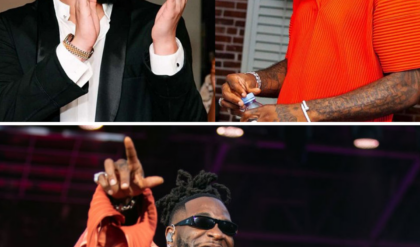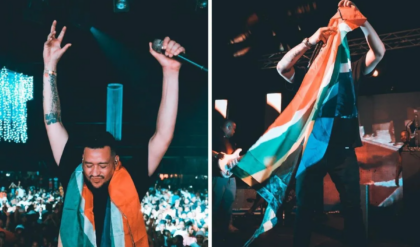Jason Whitlock EXPOSES DEWANNA BONNER After Racist Attacks on Caitlin Clark!
In the world of sports, tensions often flare both on and off the court. Recently, the spotlight has focused on a heated controversy involving WNBA stars Caitlin Clark, Dewanna Bonner, and D’Jana Carrington. The debate has touched on issues of race, sportsmanship, and the role of social media, bringing about sharp commentary from outspoken sports analyst Jason Whitlock.
The Eye-Poke Incident: A Catalyst for Debate
The controversy erupted after a playoff game between the Connecticut Sun and the Indiana Fever, when Carrington appeared to poke Caitlin Clark in the eye during a heated moment. Many fans, upon reviewing the slow-motion replay, perceived the move as intentional. Clark, visibly in pain, fell to the ground, yet no foul was called, sparking outrage on social media. Fans of Clark, a rising star in the WNBA, were quick to demand accountability, with some even calling for Carrington’s suspension.
Basketball analyst Rachel Deita was among the first to publicly criticize the referees, calling for a review of the play and accusing the league of failing to protect one of its brightest stars.
Alyssa Thomas Enters the Fray
The situation took a dramatic turn when Alyssa Thomas, a teammate of Carrington on the Connecticut Sun, defended her fellow player. In a post-game interview, Thomas accused Caitlin Clark’s predominantly white fan base of being racially motivated in their criticism of Carrington. Thomas, a seasoned veteran in the league, expressed her frustration: “In my 11-year career, I’ve never experienced such racial comments from a fan base.”
To Thomas, this wasn’t just about basketball—it was about racism, a much larger issue that she believed had permeated the conversation. This accusation added fuel to an already smoldering fire, turning a discussion about sportsmanship into a broader societal debate about race in America.
Jason Whitlock’s No-Holds-Barred Take
Enter Jason Whitlock, a sports commentator known for his unfiltered and often polarizing opinions. He wasted no time in responding to Thomas’ claims, questioning whether her accusations of racism were merely a distraction to deflect from Carrington’s unsportsmanlike behavior. According to Whitlock, the real issue wasn’t race—it was Carrington’s actions on the court. Whitlock suggested that Thomas was using identity politics to shift the focus away from her teammate’s questionable conduct.
In Whitlock’s view, the backlash against Carrington had nothing to do with race and everything to do with her behavior during the game. He argued that players should be held accountable for their actions, regardless of the color of their skin. Whitlock’s take quickly gained traction, adding yet another layer of debate to an already complex situation.
The Broader Discussion: Race, Gender, and Power in Sports
Whitlock’s critique didn’t just focus on the incident itself; he tapped into a larger conversation about race, gender, and power in sports. Caitlin Clark, a white player, has ascended to unprecedented stardom in the WNBA, bringing in record-breaking endorsement deals and packing arenas full of fans. With her rise, however, has come increased scrutiny—both of her and the players around her.
Whitlock suggested that much of the animosity toward Clark might stem from jealousy over her success. After all, Clark’s meteoric rise has brought newfound attention to the WNBA, and it’s not hard to imagine that her dominance on the court could create tension among her peers. But for Whitlock, this wasn’t an excuse for unsportsmanlike conduct or deflecting criticism with accusations of racism.
The Role of Social Media and Its Impact on Athletes
In her defense of Carrington, Thomas also highlighted the role of social media in modern sports. She pointed out that players, particularly athletes of color, face an increasing barrage of hateful comments and harassment online. As the WNBA grows in popularity—thanks in part to stars like Caitlin Clark—players are subject to more intense scrutiny than ever before. What was once a quiet league now finds itself at the center of national conversations, with fans and critics alike weighing in on every move.
Thomas’ frustration is understandable. The surge in WNBA viewership has brought both positive and negative attention to the league, amplifying the criticism and vitriol that players must endure. Social media, which was once a space for fans to connect with their favorite athletes, has become a battleground for hate speech and harassment. This toxic culture weighs heavily on players’ mental health, and Thomas’ decision to speak out highlights the growing concern about the impact of online negativity.
A Complex Issue Without Easy Answers
The incident between Caitlin Clark and D’Jana Carrington has become a flashpoint for a much larger discussion about race, sportsmanship, and accountability in the WNBA. Whitlock’s contention that the accusations of racism are being used to deflect from Carrington’s actions has ignited debate, but both sides have valid points. On one hand, Carrington’s actions during the game deserve scrutiny, and the league should be held accountable for enforcing its rules. On the other hand, the broader issues of racism and sexism in sports cannot be ignored, and Thomas’ frustration with the racial dynamics in the league speaks to the challenges that athletes of color continue to face.
As the WNBA continues to grow in popularity, these issues will only become more pronounced. The league and its players will need to navigate the complex intersection of sports, race, and social media as they move forward. The Caitlin Clark controversy is just one example of the challenges that lie ahead, but it’s clear that these conversations are far from over.






